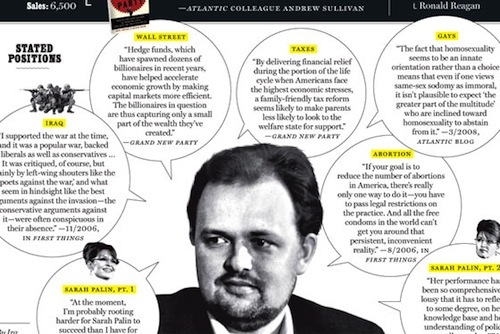Fellow Ross Douthat hater Miracle Mike Sebba sent me this link to a Sunday Times column in which the spoon-faced conservative explains eugenics. He devotes the first five paragraphs to the dim science of Spencer and Sanger,* but his real purpose is to get us![]() to modern fetal genome mapping. We can do that now—the whole famn detal genome with saliva and blood samples from parents. Douthat compares the practice to amniocentesis screening for Down Syndrome, where 90% of positive results end in termination of the pregnancy. Then he hits us with his thesis:
to modern fetal genome mapping. We can do that now—the whole famn detal genome with saliva and blood samples from parents. Douthat compares the practice to amniocentesis screening for Down Syndrome, where 90% of positive results end in termination of the pregnancy. Then he hits us with his thesis:
Is this sort of “liberal eugenics,” in which the agents of reproductive selection are parents rather than the state, entirely different from the eugenics of Fisher’s era, which forced sterilization on unwilling men and women?
That’s some dirty rhetoric from Douthat. He’s got god on his side, but luckily for us we have close reading.
His question—is this thing I have named “liberal eugenics” some kind of eugenics?—sounds innocent at first, but it’s actually sort of loaded. Eugenics is generally understood as the science of improving the human gene pool through selective breeding. It found a lot of adherents in the early 20th century when, frustrated by the math involved in nuclear physics, white scientists turned to investigating why they were so much smarter than everyone else. Douthat admits that many eugenicists were “WASP grandees,” but he adds others “were often political and social liberals—advocates of social reform, partisans of science, critics of stasis and reaction.”
Of course, eugenics became a dirty word after the rise of Nazism, which A) was not exactly a liberal movement and B) made Germany the only modern state to implement eugenic policies. But theoretically, even though eugenics is a historical curiosity with no adherents today, and even though the most reviled state in history is the only one ever to have implemented it, “it is hard to imagine that more expansive knowledge won’t lead to similar forms of prenatal selection on an ever-more-significant scale.”
First of all, don’t even waste your time trying to imagine a society of expanding knowledge that does not practice eugenics—it’s just too hard. Second, that hypothetical extrapolation of what new science might lead to in the future provides the antecedent for “this liberal eugenics.” The two-word subject of Douthat’s thesis is a refutation of a hypothetical extrapolated from a historical theory that is itself a discredited hypothesis, plus the word liberal. Its structure suits Douthat’s argument nicely, since the whole thing is predicated on the protection of hypothetical human beings.
Douthat gets from amniocentesis to Nazis by erecting a false dichotomy. On one hand, there is the ability to analyze spit and determine whether someone’s kid will have Down Syndrome. On the other hand, there is a kid with Down Syndrome. Granted, that kid has not been born. He exists as pure conceptual potentiality, the way the sandwich I could make this afternoon exists. Once I put that sandwich in my mind, though, the choice to do something else this afternoon—to ride my bike, say—becomes the choice to destroy that sandwich. My bicycle takes on a moral dimension. It is a destroyer of sandwiches, the way a test that prevents parents from having children with Down Syndrome destroys future, hypothetical people with Down Syndrome.
Of course, there is a difference between preventing something and destroying it. That distinction operates simply according to time—a constraint that conveniently does not operate in the world of rhetoric. Before we continue, let us note that people who aren’t born yet do not exist. That’s an intuitive truth in the case of the hypothetical children whose imaginary parents might apply the eventual science that Douthat extrapolates from what can be done today, and it’s a legal truth with respect to fetuses. People who were never born must not get the same weight in decisions as real living people, lest my decision to break up with my high school girlfriend become tantamount to murdering the three children we never had.
So that, as my eighth-grade math teacher used to say, is the long way around the barn. Douthat’s argument is stupid because it uses people who were never born to warn us against a hypothetical science that is superficially similar to a social philosophy everyone is now against. Rhetorically, it’s all sleight of hand. The short way around the born runs via the obvious logical flaw in Douthat’s argument: the difference between eugenics and amniocentesis is that the government doesn’t make you get an amniocentesis and then sterilize you. Hence the “liberal” in Douthat’s “liberal eugenics.” But that’s just the distinction between a choice individuals can make and a choice the state makes for them. It’s like when Alabama put Martin Luther King in jail, and then when he came home he accidentally locked himself in the garage. Is this sort of liberal incarceration entirely different?





I love when you dissect rhetoric. It’s always funny and logical, the intersection of good times.
B) made Germany the only modern state to implement eugenic policies.
The United States implemented eugenic sterilization programs before the Nazis did. In fact, tens of thousands of US citizens were sterilized, and there were even vocal calls for compulsory euthanasia. In fact, the state of North Carolina just paid reimbursements to thousands of poor, mostly black women who were sterilized in the 60s and 70s.
Eugenics might be out of fashion, but it was a real force in the US. Don’t downplay that history.
http://en.wikipedia.org/wiki/Eugenics_in_the_United_States#Compulsory_sterilization